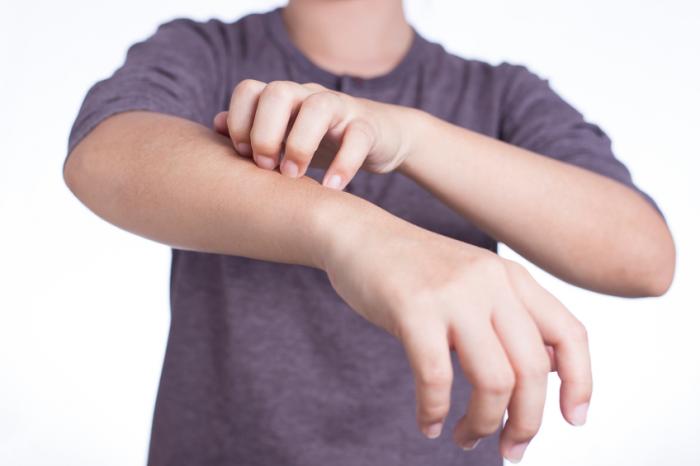Contents
Just when you thought you couldn’t get any more embarrassed about your eczema, you realize that it seems to have a smell to it. There is a slight funkiness to your skin which really doesn’t smell right, and all sorts of questions leap into your head.
What does eczema skin smell like? Is this something you need to be worried about? Can other people smell it too? What can you do to address it?
Parents of eczema babies probably have their first experience of the skin condition when their little one gets cradle cap, which has a distinct smell to it. Eczema can have a similar smell, which some sufferers can detect even before a flare-up occurs, and which will get worse as crusts form and if infection and weeping sets in.
Eczema skin smell is unique to the condition and will also vary from sufferer to sufferer. Not everyone who suffers from eczema will notice this smell.
Why Does Eczema Smell Bad?
Eczema skin does sometimes smell and can do so before a flare up, after crusts have formed and especially if the area has become infected.
The smell of infection is strong and is a sign that you should be concerned, but we will talk a bit more about this later. There are different reasons why your skin might smell that are not related to infection, and you will be happy to know that there are lots of things you can do about it.
Why Topical Steroids Make Eczema Smell?
Treatments including topical steroids, antihistamines, antibiotics and immunosuppressants
A number of treatments for eczema can cause your skin to smell because they cause changes in your body to help you counteract or suppress eczema.
Steroids increase the acid in your body which causes the smell. They also bring on hormonal changes and can delay your skins ability to heal, both of which may increase the smell.
Antihistamines can also cause your body to create more acid, to sweat more, and affect your liver, putting it into detoxification, again all stinky things.
Immunosuppressants Lead to Smelly Eczema
Immunosuppressants suppress the immune system and can have a smell as a side effect of this. They also affect the kidneys’ ability to do their job, which also can result in stinky skin.
If you have been prescribed antibiotics for a skin infection or any other condition, these can also have a smelly side effect. It is important however that you don’t stop using antibiotics until you have completed the course, as taking them is essential to treating the infection and helping your body to get better.
If you are not sure if you are using topical steroids, check the list here.
Diet can also make your Eczema Smell Worse
Often people who suffer from eczema find relief in a restricted diet, such as going gluten-free and dairy-free. This may reduce your chance of flare-ups, but as a side effect can cause ketosis in your body, which manifests in a chemically kind of smell in your pores and your breath.
You might be eating at the other end of the scale however and eating a poor diet that is high in convenience foods, sugar and trans fats. This kind of diet can also make your eczema worse and can cause body odour.
Why Does Dead Skin Smell?
People with dry and flaky skin can have a lot of dead skin cells on their bodies, which can have a tendency to smell. Scratching also lifts up skin cells and releases odours that are normally better held within the closed skin.
Is Eczema Smell Something You Need to be Worried About?
If your skin or your child’s skin is infected it will become quite pungent and is something you need to be concerned about. The smell at this time is a sign that something is wrong.
Infection is common with eczema, especially in babies and small children, because the wounds are constantly open and all sorts of germs and substances get into them. Scratching doesn’t help because the germs on your hands and under your fingernails get into the wound.
If the smell is bad, and the wound is oozing, weeping, or has yellowish crusts, then most likely the sufferer has an infection. Immediately see a doctor to be prescribed antibiotics to deal with the infection. You may also need to put extra interventions in place to prevent scratching so that the wounds themselves get a chance to heal.
Can Other People Smell it?
If the eczema smell is from treatments or diet then it is unlikely the smell is traveling very far from your skin, and probably won’t be detectable by people except those closest to you such as partners or family. It is usually only people who are familiar with the unique eczema skin smell that will pick up on it.
Try not to feel self-conscious in public places such as work or on public transport, as it really isn’t as obvious as you think.
When eczema has a smell, it is usually built up over time and months of applying topical or ingested treatments. It is a gradual process, and although it may be obvious to you and those closest to you, acquaintances and strangers won’t pick up on it.
It is not related to bad hygiene and is not something you should feel self-conscious or embarrassed about (although just saying that will not necessarily make you feel better). Showering more often will not help and will strip your skin of essential oils, so extra bathing is not recommended.
As an interesting note, just as dogs can smell illness in people, some people have a higher sensitivity of smelling when infection or illness is going to set in. Studies show that this is partly to do with smell and partly with visual signals as well, but might be a basic defense mechanism to help us protect ourselves from contagions.
How to Prevent Eczema Smell?

Stop using Certain Treatments

You can stop using the treatments such as topical steroids which are causing your skin to smell; this is probably the best way to treat the smell. Talk to your doctor about withdrawing from any treatment and also about alternative options.
When you withdraw from something like topical steroids your skin can smell worse before it gets better, and the smell can linger for a little while after you have stopped using the cream, so be patient in this.
Adjust Your Diet : (Eczema Diet Plan)
In terms of diet, you can eat well for your skin without putting your body into ketosis. Eat lots of fresh fruit and vegetables, and maintain carbs, but eat healthier ones such as gluten-free oats, brown rice, sweet potatoes and quinoa. Consume healthy oils as well, including avocado, nuts, salmon and olive oil.
It can help your skin to increase your intake of certain skin-healthy nutrients, including zinc, calcium, B, C and E vitamins and omega 3.
Try not to scratch

The smell that can emanate from skin conditions like eczema is yet another reason not to scratch (it’s not like you don’t hear that often enough…) Scratching opens up wounds and releases odour and dead skin cells as well as letting in germs – so every time you can resist scratching you are better off in so many ways.
Try to exfoliate in the bath with a warm washcloth to lift off the crusts and dead skin cells as much as you can and then moisturize with a good emollient cream after bathing to seal in the skin’s oils and nutrients.
- Take lukewarm baths or showers, and avoid really hot showers.
- Don’t use ordinary soap, as the ingredients may aggravate your eczema. Wash your body with warm water alone. …
- Bath oils can help to moisturise your skin while bathing.
- When towelling dry, pat rather than rub your skin.
What Products are Good For Eczema
Fragrance-free emollients
Good quality moisturizers for eczema are fragrance-free and quite basic in terms of their ingredients. Some of the best include the ranges from Vaseline, Cetaphil, Aveeno and QV. Look for a cream or moisturizer that has a higher proportion of oil than water in the content (lotions, for example, are usually not moisturizing enough).
We highly recommend for Babies using Aveeno Eczema Cream and for adults Manuka honey Cream.
Oils in the bath
A bath is wonderful for eczema sufferers, but make sure it isn’t too hot, as heat can make you flare up. Only put natural products in the bath; some great options include olive oil or almond oil, oats or Epsom salts.
These natural products will help soothe your skin as well as moisturize and seal in the skin’s natural oils.
Try Dead Sea Salts baths, Epsom Salt Bath , bleach bath, Oatmeal Bath, Baking Soda, Neem Oil & leaves, Aloe Vera & Apple Cider Vinegar we reviewed them recently and found that many people find relief from using these.
Natural Scents from Essential oils for Eczema
Using diluted essential oils in a spritz or as a massage oil can also seal the skin and help keep it moisturized, as well as replacing the eczema smell with something far more pleasant. Some essential oils also have healing and antiseptic properties and can remove germs and help your skin to get better.
Some great essential oils for eczema sufferers include lavender, tea tree, chamomile and lemon. For more information about oils for eczema see our article here.
Why Does Eczema Skin Smell – a Summary
It is completely normal for eczema skin to smell, and is usually due to the treatments you’ve been using, your diet or perhaps your chronic scratching. This is not caused by poor hygiene and is not from anything you are doing wrong or should be embarrassed about.
It is most likely that other people can’t pick up on the odour (except those who already love you), so try not to feel self-conscious about it.
If you notice a smell, talk to your doctor. If it is something you are using to treat the condition they will be able to suggest alternatives, and if it is a sign of something more concerning, such as infection, your doctor will be able to help with that too.
There are lots of easy adjustments you can make and lovely natural products you can use to help with the smell.
Resources
- https://www.webmd.com/a-to-z-guides/news/20170530/can-people-sniff-out-illness-in-others
- https://nationaleczema.org/eczema-products/moisturizers/
- https://health.howstuffworks.com/wellness/men/sweating-odor/dry-skin-odor.htm
- https://www.jolieeskin.com/blogs/news/why-does-my-eczema-smell-bad-and-what-can-i-do-about-it
Want to know more about various types of eczema:
Contact Dermatitis | Weeping Eczema | Eczema on Lips | Dyshidrotic Eczema | Eczema on Hands | Follicular Eczema | Eczema on Ear | Eczema on Eyes | Nummular Eczema | Eczema on Face | Perioral Dermatitis







2 Comments
Carl
9:02 pm . June 5, 2018
There are many sensitive topics when it comes to treating and managing eczema that needs to be talked about to help others. You can feel very isolated and lonely when you suffer from eczema or any other skin conditions. By reading others experiences can help you to realize that you’re not alone and there is help available.
We hope this article helps someone who is concerned and worried about their skin. Thank you Eczema Living for sharing our article to help other.
Nav Gosal
10:53 am . June 27, 2018
Thank you Carl for sharing information.